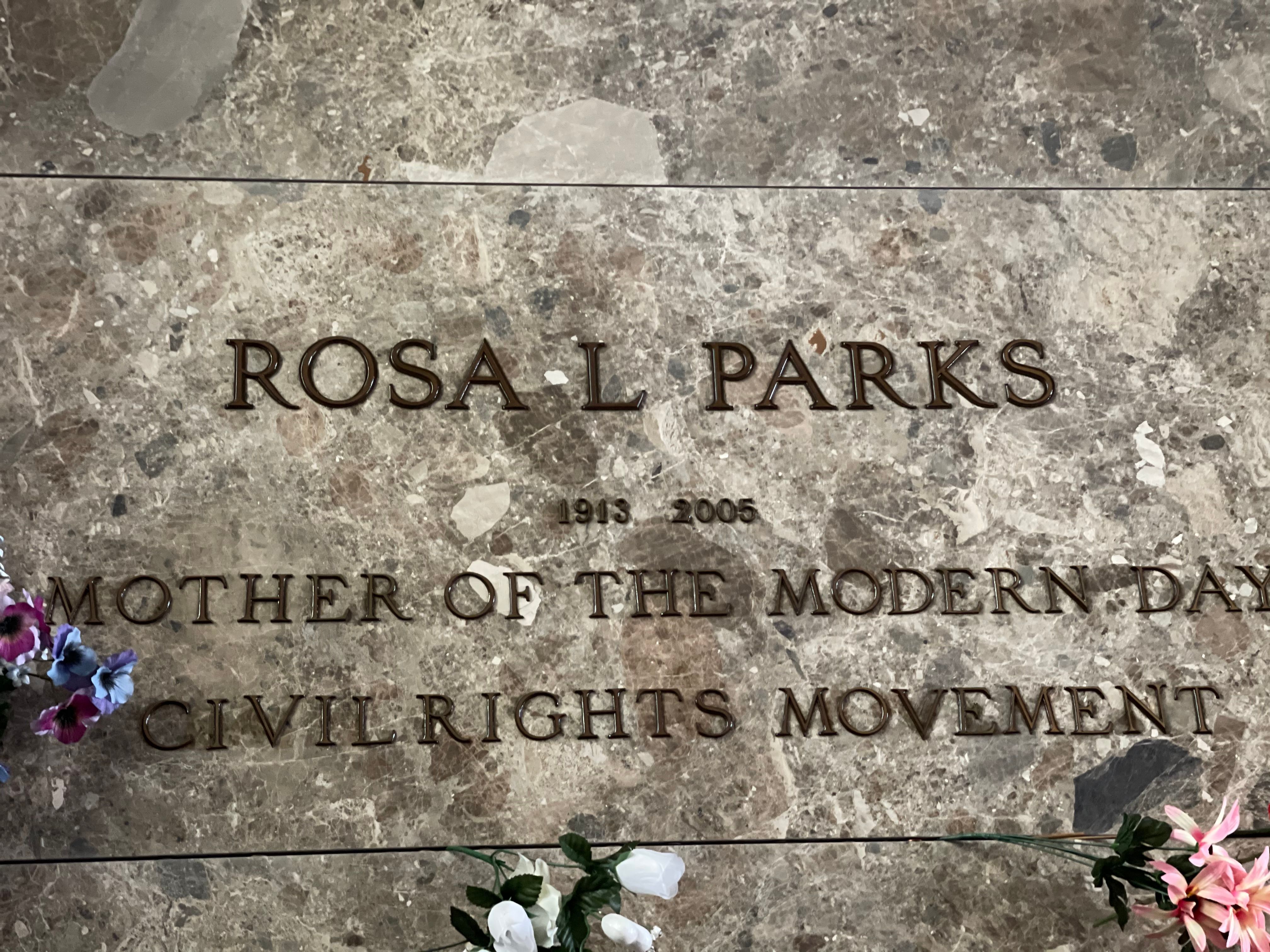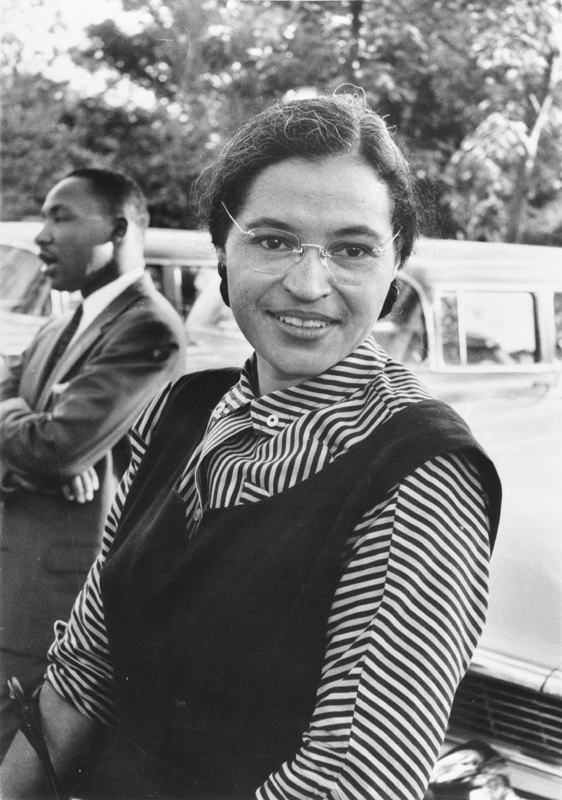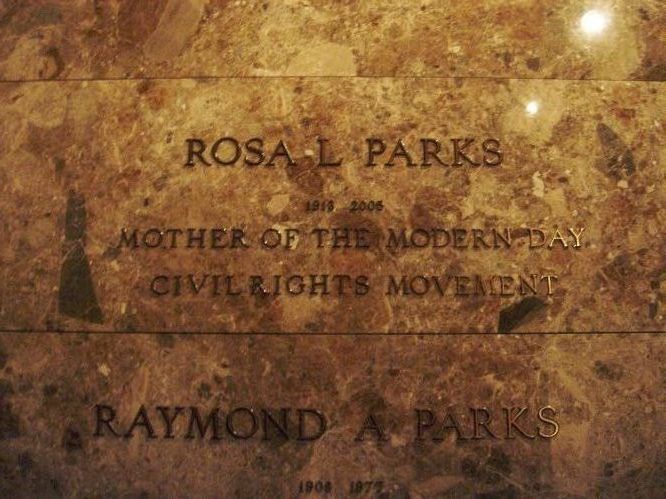Civil Rights Pioneer and Social Activist. An African-American working woman, she became most famous for her refusal in 1955 to give up a bus seat to a white man who was getting on the bus, an incident that led to her arrest and inspired Dr. Martin Luther King, Jr. to lead the Montgomery, Alabama bus boycott, one of his first Civil Rights actions. Because of this action, she was called the "Mother of the Modern Civil Rights Movement." She was also the first woman to ever lie in state in the United States Capitol, and the United States Flag was flown at half-staff in her honor over all public buildings on the day of her funeral. Born Rosa Louise McCauley in Tuskegee, Alabama, she was the daughter of James and Leona McCauley, a carpenter and a school teacher. When her parents separated, she moved with her mother to Pine Level, Alabama, outside Montgomery, where she grew up on a farm. Initially home schooled, she enrolled in the Industrial School for Girls in Montgomery when she was 11, later dropping out to care for her ill mother and grandmother. In 1932, she married Raymond Parks, a barber, who helped her earn her high school diploma. Raymond was a member of the NAACP, which she later joined in 1943, becoming elected secretary of the local Montgomery chapter. In 1944, she worked at Maxwell Air Force Base, where segregation was not permitted in federal facilities, and it made her realize that racial integration was possible. In 1955, Rosa was not the first African-American to refuse to give up her seat to a white person; however, it was her refusal that sparked the Civil Rights movement into becoming a significant movement for creating change in America. Parks was fined $10 plus $4 in court costs for violating local city law, and immediately, with civil rights movement support, appealed her conviction. The bus boycott lasted 381 days, and placed Dr. Martin Luther King firmly into the national headlines. In January 1956, a lawsuit entered into federal court against the city of Montgomery struck down the city law as unconstitutional, forcing integration on the buses, and with that ruling the bus boycott ended. After her arrest, Rosa became famous in the growing civil rights movement, however, she was fired from her job. In 1957, she and Raymond moved to Hampton, Virginia, both to find work and because of disagreements with Dr. King and other leaders over civil rights strategy. After several months in Virginia, they moved to Detroit, Michigan, where she worked as a seamstress, until Congressman John Conyers (D-Michigan) hired her in 1965 to work as his secretary. She continued to work for him until 1988, when she retired. Her husband died in 1977 from cancer. In 1992, she published her autobiography, "Rosa Parks: My Story," and in 1995, published a revised autobiography, "Quiet Strength." She died in her apartment in a Detroit nursing home at the age of 92. She was the 31st person, the first woman, and the second African-American (the first was Jacob Chestnut) to lie in state in the Capitol Rotunda. She was interred next to her husband and her mother at the Detroit Woodlawn Cemetery's mausoleum. She has been the recipient of numerous honors and awards, including a Congressional Gold Medal, the Presidential Medal of Freedom, and the Alabama Governor's Medal of Honor for Extraordinary Courage, in addition to over two dozen honorary doctorate degrees from various universities and colleges.
Civil Rights Pioneer and Social Activist. An African-American working woman, she became most famous for her refusal in 1955 to give up a bus seat to a white man who was getting on the bus, an incident that led to her arrest and inspired Dr. Martin Luther King, Jr. to lead the Montgomery, Alabama bus boycott, one of his first Civil Rights actions. Because of this action, she was called the "Mother of the Modern Civil Rights Movement." She was also the first woman to ever lie in state in the United States Capitol, and the United States Flag was flown at half-staff in her honor over all public buildings on the day of her funeral. Born Rosa Louise McCauley in Tuskegee, Alabama, she was the daughter of James and Leona McCauley, a carpenter and a school teacher. When her parents separated, she moved with her mother to Pine Level, Alabama, outside Montgomery, where she grew up on a farm. Initially home schooled, she enrolled in the Industrial School for Girls in Montgomery when she was 11, later dropping out to care for her ill mother and grandmother. In 1932, she married Raymond Parks, a barber, who helped her earn her high school diploma. Raymond was a member of the NAACP, which she later joined in 1943, becoming elected secretary of the local Montgomery chapter. In 1944, she worked at Maxwell Air Force Base, where segregation was not permitted in federal facilities, and it made her realize that racial integration was possible. In 1955, Rosa was not the first African-American to refuse to give up her seat to a white person; however, it was her refusal that sparked the Civil Rights movement into becoming a significant movement for creating change in America. Parks was fined $10 plus $4 in court costs for violating local city law, and immediately, with civil rights movement support, appealed her conviction. The bus boycott lasted 381 days, and placed Dr. Martin Luther King firmly into the national headlines. In January 1956, a lawsuit entered into federal court against the city of Montgomery struck down the city law as unconstitutional, forcing integration on the buses, and with that ruling the bus boycott ended. After her arrest, Rosa became famous in the growing civil rights movement, however, she was fired from her job. In 1957, she and Raymond moved to Hampton, Virginia, both to find work and because of disagreements with Dr. King and other leaders over civil rights strategy. After several months in Virginia, they moved to Detroit, Michigan, where she worked as a seamstress, until Congressman John Conyers (D-Michigan) hired her in 1965 to work as his secretary. She continued to work for him until 1988, when she retired. Her husband died in 1977 from cancer. In 1992, she published her autobiography, "Rosa Parks: My Story," and in 1995, published a revised autobiography, "Quiet Strength." She died in her apartment in a Detroit nursing home at the age of 92. She was the 31st person, the first woman, and the second African-American (the first was Jacob Chestnut) to lie in state in the Capitol Rotunda. She was interred next to her husband and her mother at the Detroit Woodlawn Cemetery's mausoleum. She has been the recipient of numerous honors and awards, including a Congressional Gold Medal, the Presidential Medal of Freedom, and the Alabama Governor's Medal of Honor for Extraordinary Courage, in addition to over two dozen honorary doctorate degrees from various universities and colleges.
Bio by: Erik Lander
Inscription
Mother of the Modern Day Civil Rights Movement
Family Members
Advertisement
See more Parks memorials in:
Records on Ancestry
Sponsored by Ancestry
Advertisement












